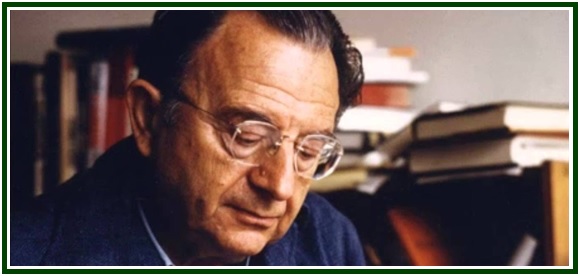
Self-Knowledge Emerges
From Acting With Justice
Erich Fromm

Erich Fromm (1900-1980)
00000000000000000000000000000000000000000000
Editorial Note:
Unlike Carl G. Jung, who had sympathies
for Nazism during the 1930s, Erich Fromm saw
Ethics as part of Psychology. This is one of the central
elements in common between original theosophy and
Fromm’s thought. One might ask, though, why is it that
ethics should be important in esoteric philosophy. Ethics
is central to real theosophy because one must reap what one
sows, and Ethics is the art and science of sowing good karma.
Pseudo-Theosophy, on the other hand, prefers to follow C.G.
Jung instead of Ethics. The following text is a fragment from
the book “Man For Himself”, by Erich Fromm, published
by Holt, Rinehart and Winston, New York, 1960, 254 pp. It
can be found at the Foreword, pp. VII-IX.
(Carlos Cardoso Aveline)
000000000000000000000000000000000000000000000000000
In his eclectic admiration for any
religion [Carl G.] Jung has relinquished
[the] search for the truth in his theory.
It may be surprising to many readers to find a psychoanalyst dealing with problems of ethics and, particularly, taking the position that psychology must not only debunk false ethical judgments but can, beyond that, be the basis for building objective and valid norms of conduct.
This position is in contrast to the trend prevailing in modern psychology which emphasizes “adjustment” rather than “goodness” and is on the side of ethical relativism. My experience as a practicing psychoanalyst has confirmed my conviction that problems of ethics can not be omitted from the study of personality, either theoretically or therapeutically.
The value judgments we make determine our actions, and upon their validity rests our mental health and happiness. To consider evaluations only as so many rationalizations of unconscious, irrational desires – although they can be that too – narrows down and distorts our picture of the total personality. Neurosis itself is, in the last analysis, a symptom of moral failure (although “adjustment” is by no means a symptom of moral achievement). In many instances a neurotic symptom is the specific expression of moral conflict, and the success of the therapeutic effort depends on the understanding and solution of the person’s moral problem.
The divorcement of psychology from ethics is of a comparatively recent date. The great humanistic ethical thinkers of the past, on whose works this book is based, were philosophers and psychologists; they believed that the understanding of man’s nature and the understanding of values and norms for his life were interdependent. Freud and his school, on the other hand, though making an invaluable contribution to the progress of ethical thought by the debunking of irrational value judgments, took a relativistic position with regard to values, a position which had a negative effect not only upon the development of ethical theory but also upon the progress of psychology itself.
The most notable exception to this trend in psychoanalysis is C.G. Jung. He recognized that psychology and psychotherapy are bound up with the philosophical and moral problems of man. But while this recognition is exceedingly important in itself, Jung’s philosophical orientation led only to a reaction against Freud and not to a philosophically oriented psychology going beyond Freud.
To Jung “the unconscious” and the myth have become new sources of revelation, supposed to be superior to rational thought just because of their nonrational origin. It was the strength of the monotheistic religions of the West as well as of the great religions of India and China to be concerned with the truth and to claim that theirs was the true faith. While this conviction often caused fanatical intolerance against other religions, at the same time it implanted into adherents and opponents alike the respect for truth.
In his eclectic admiration for any religion Jung has relinquished this search for the truth in his theory. Any system, if it is only nonrational, any myth or symbol, to him is of equal value. He is a relativist with regard to religion – the negative and not the opposite of rational relativism which he so ardently combats. This irrationalism, whether veiled in psychological, philosophical, racial or political terms, is not progress but reaction. The failure of eighteenth – and nineteenth – century rationalism was not due to its belief in reason but to the narrowness of its concepts. Not less but more reason and an unabating search for the truth can correct errors of a one-sided rationalism – not a pseudo-religious obscurantism.
Psychology can not be divorced from philosophy and ethics nor from sociology and economics.
000
In September 2016, after a careful analysis of the state of the esoteric movement worldwide, a group of students decided to form the Independent Lodge of Theosophists, whose priorities include the building of a better future in the different dimensions of life.
000
E-Theosophy e-group offers a regular study of the classic, intercultural theosophy taught by Helena P. Blavatsky (photo).

Those who want to join E-Theosophy e-group at YahooGroups can do that by visiting https://groups.yahoo.com/neo/groups/E-Theosophy/info.
000